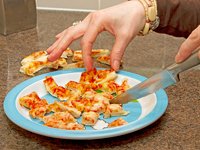If you’ve got young children, chances are life is a whirlwind. It feels like you are always on the run going to work, chaperoning on playdates, attending gym classes, visiting friends and family, and trying to squeeze in some household errands between it all. As you make your mad dash out the door, you probably grab a prepackaged meal or snack for your little one to eat…maybe even on a regular basis. While there’s no denying the convenience of these types of foods, they are not the healthiest choice for a growing toddler. In fact, recent research has found that ready-to-eat toddler meals are very likely to be quite excessive in sodium content–and not the good kind.
The study, which was undertaken at the Centers for Disease Control and Prevention in Atlanta, Georgia, found that more than 75 percent of the 90 prepackaged meals for toddlers assessed for the experiment contained too much sodium to be healthy.1 Doheny, Kathleen. “Ready-to-Eat Foods for Toddlers Often Too Salty.” WebMD. 21 March 2013. Accessed 28 March 2013. http://children.webmd.com/news/20130321/ready-to-eat-foods-for-toddlers-often-too-salty-study Overall, the scientists checked the listing of sodium content for 1,115 food items for both babies and toddlers. An item was categorized as high in sodium if it contained more than 210 milligrams (mg) of sodium in a serving.
The foods marketed to be served to babies under one year old tend to be much lower in sodium than those for toddlers. That was attributed mainly to the fact that the baby foods consisted of simpler recipes, including only one or two ingredients in most cases. And the majority of those ingredients were healthy, meant to introduce the babies to the flavors of fruits and vegetables.
However, once they crossed the threshold to toddlerdom, the prepackaged foods aimed at one- to three-year-olds were a vastly different story. Perhaps trying to emulate many of the foods that parents and older siblings would typically eat, the toddler meals consisted of such fare as pepperoni pizza, macaroni and cheese, chicken with pasta, and chicken noodle soup. The snacks were items along the lines of cheese and crackers and cereal bars.
The toddler meal options evaluated varied from 100 mg of sodium per serving to 630 mg per serving. The upper end of that range almost assures that toddlers eating these foods will consume too much sodium in one day. The RDI for sodium for a toddler is 1,000 mg.2 “Sodium RDA, Benefits and Sources.” Diet & Fitness today. (Accessed 29 Mar 2013. http://www.dietandfitnesstoday.com/sodium.php The average amount of sodium found in prepackaged toddler meals was 369 mg, and 71 percent of the products were over the 210 mg bar set by the researchers. The toddler snacks contained anywhere from 0 mg of sodium per serving to 310 mg. Therefore, if you were to feed your toddler one prepackaged meal toward the high sodium end of the range and then a snack of this type also toward the high end, you could easily be providing 900 mg of sodium in just a few hours.
Sodium is used in these types of processed convenience foods to add some flavor and act as a preservative to extend their shelf life.3 “Why Processed Foods Contain So Much Sodium.” Fit Day. Accessed 29 March 2013. http://www.fitday.com/fitness-articles/nutrition/healthy-eating/why-processed-foods-contain-so-much-sodium.html#b But as tempting as they are to keep stacked in your pantry to help you avoid having to make meals early in the morning, ready-to-eat options such as these are just not the way to go. Take a page from the infant nutrition choices and try to keep your toddlers on track with simple foods that contain minimal ingredients. If mornings are hectic in your household, prepare your foods the night before. Keep an assortment of fresh fruit and vegetables on hand, along with whole grain breads and crackers. Then add a little cheese, a veggie burger, or some roast chicken left over from dinner, and you will have a great bring-along meal for a toddler that doesn’t involve any extra cooking.
Another benefit to this approach is that if your children aren’t eating prepackaged, high-sodium foods, there will be less of an opportunity for them to develop a taste for all that salt. Numerous studies have shown that salt is an acquired taste, including 2012 research at the Monell Chemical Senses Center in Philadelphia, Pennsylvania.4 Stein, LJ, et al. “The development of salty taste acceptance is related to dietary experience in human infants: a prospective study.” National Institutes of Health. January 2012. Accessed 29 March 2013. http://www.ncbi.nlm.nih.gov/pubmed/22189260 In fact, the taste for salt is linked to the same centers in the brain as drug addiction.5 “Salt Appetite Is Linked to Drug Addiction, Research Finds.” Science Daily. July 29, 2011. (Accessed 29 Mar 2013.) http://www.sciencedaily.com/releases/2011/07/110711151451.htm And a high sodium diet can take a toll over time, having been linked with high blood pressure and cardiovascular disease.6 “Where’s the sodium?” Centers for Disease Control and Prevention. 7 February 2012. Accessed 29 March 2013. http://www.cdc.gov/vitalsigns/sodium That is definitely not the road any parent wants to start their children on at such as young age.
References
| ↑1 | Doheny, Kathleen. “Ready-to-Eat Foods for Toddlers Often Too Salty.” WebMD. 21 March 2013. Accessed 28 March 2013. http://children.webmd.com/news/20130321/ready-to-eat-foods-for-toddlers-often-too-salty-study |
|---|---|
| ↑2 | “Sodium RDA, Benefits and Sources.” Diet & Fitness today. (Accessed 29 Mar 2013. http://www.dietandfitnesstoday.com/sodium.php |
| ↑3 | “Why Processed Foods Contain So Much Sodium.” Fit Day. Accessed 29 March 2013. http://www.fitday.com/fitness-articles/nutrition/healthy-eating/why-processed-foods-contain-so-much-sodium.html#b |
| ↑4 | Stein, LJ, et al. “The development of salty taste acceptance is related to dietary experience in human infants: a prospective study.” National Institutes of Health. January 2012. Accessed 29 March 2013. http://www.ncbi.nlm.nih.gov/pubmed/22189260 |
| ↑5 | “Salt Appetite Is Linked to Drug Addiction, Research Finds.” Science Daily. July 29, 2011. (Accessed 29 Mar 2013.) http://www.sciencedaily.com/releases/2011/07/110711151451.htm |
| ↑6 | “Where’s the sodium?” Centers for Disease Control and Prevention. 7 February 2012. Accessed 29 March 2013. http://www.cdc.gov/vitalsigns/sodium |











